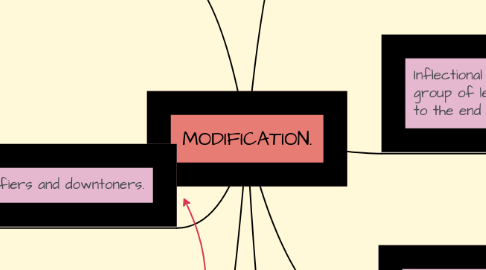
1. Adverbs.
1.1. They modifies adjectives, verbs and other adverbs.
2. Adjectives.
2.1. Modifies nouns.
2.2. Usually appears between the determiner and the noun.
2.3. Idiosyncratric adjectives.
2.3.1. Present participle.
2.3.1.1. Breaking glasses.
2.3.2. Past participle.
2.3.2.1. Broken glasses.
3. Intensifiers and downtoners.
3.1. Intensifiers ex. Utter, complete, total.
3.1.1. That was a complete desaster.
3.2. Downtoners Ex.. rather, a bit of, a kind of.
3.2.1. My boss is a sort of a jerk.
4. Inflectional ending: a group of letters added to the end of a word. .
4.1. -s
4.1.1. More than one. Ex. Bat - bats.
4.2. - es
4.2.1. More than one. Ex. Mix - mixes.
4.3. - ing.
4.3.1. Means an action is happening in the moment. Ex. Happen - happening.
4.4. - ed
4.4.1. Means an action already happened. Ex. Peck - pecked.
5. Adjective position.
5.1. Prenominal adjectives.
5.1.1. Ex. This is a risky business.
5.1.2. Denominal adjectives.
5.1.2.1. Ex. Wooden boat.
5.2. Predicate adjectives.
5.2.1. Ex.. The business seems risky.
5.3. Postnominal adjectives.
5.3.1. Ex. She considers the business risky.
6. Degree modifiers.
6.1. Too (in a negative jugdment)
6.1.1. Ex. That's too bad.
6.2. Enough (The NP has a sufficient of the quality)
6.2.1. Ex. That was the time enough..
7. Suffixes and affixes
7.1. Suffixes
7.2. Affixes.
7.2.1. anti-
7.2.1.1. anti-abortion.
7.2.2. de-
7.2.2.1. de-activate.
7.2.3. dis-
7.2.3.1. dis-continue.
7.2.4. ex-
7.2.4.1. ex-boyfriend.
7.2.5. in-
7.2.5.1. in-complete.
7.2.6. un-
7.2.6.1. un-happy.
